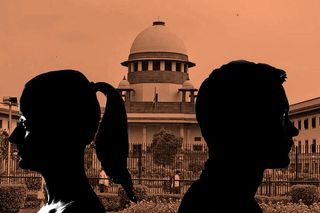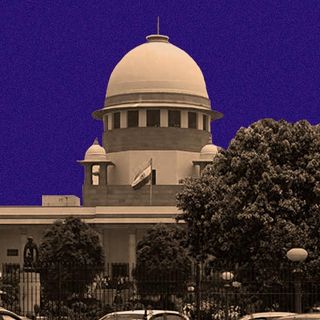
India’s Supreme Court Was Right to Overturn Adultery Law, But the Decision Was Based on Flawed Logic
Equal rights are a matter of dignity, not morality.

In 1971, Justice Anna Chandy, India’s first female High Court judge, had voted, as a member of the 42nd Law Commission, for scrapping the Indian Penal Code provision on adultery with the words, “It is the right time to consider whether the offence of adultery, as envisaged in Section 497, is in tune with the present-day notions of a woman’s status within marriage.”
Five more decades were to pass before the Supreme Court breathed life into her prophetic words. Now, she stands vindicated as the Constitution Bench of the Supreme Court, headed by the Chief Justice of India, Justice Dipak Misra, on September 27 unanimously struck down this unjust and gender discriminatory provision of the Indian Penal Code.
Section 497, which criminalized adultery, appeared to punish only men, but actually undermined women’s dignity.
In doing so, the Supreme Court has not rendered adultery legal, as some lawyers and legal experts (including the chairperson of the Delhi Commission for women) seem to presume. They have expressed their anxiety that the ruling will be license for women (or men) to stray from the marital bond. This logic is absurd and based on an erroneous understanding of the criminal provision of adultery. Adultery remains a matrimonial fault that entitles the parties to dissolve the marriage on this ground. The ruling has merely ensured that marital fidelity and sexual morality cannot be enforced by using a police whip.
The Supreme Court, by striking down the provision, has restored women’s dignity and their right to equality. Section 497, which criminalized adultery, appeared to punish only men, but actually undermined women’s dignity. This is because the law made it a crime for a man to have sexual intercourse with the wife of another man without her husband’s consent.
This meant that establishing a sexual relationship with a married woman was not a crime if her husband accepted it. Hence, the law was perceived to give no recourse to women, instead giving legal validity to the proprietorial rights of the husband over his wife.
When marriage is constructed as a patriarchal institution, the woman does not have a corresponding control over her husband’s sexuality.
Justice Rohinton Nariman has clarified this point in the recent judgment: “The statement that stability of marriages is not an ideal to be scorned, can scarcely be applied to this provision, as we have seen that marital stability is not the object for which this provision was enacted.” The provision was based on the belief that husbands owned the body of their wives; a women was the exclusive property of her husband, and if another man had sexual intercourse with her, he would be guilty of ‘stealing’ the husband’s property. The same logic as the law of theft was applied.
However, while delivering the verdict, CJI Misra and Justice AM Khanwilkar pointedly observed that such “unequal treatment of women invites the wrath of the Constitution,” while Justice DY Chandrachud held that autonomy is intrinsic to a dignified human existence. Justice RF Nariman observed that adultery violates Article 14 of the Constitution and cannot be treated as an offence. Justice Indu Malhotra held that Section 497 is a clear violation of fundamental rights granted in the Constitution.
Collectively, the bench categorically observed that the adultery provision deemed the wife as a passive being, incapable of making choices about her body or her sexual desires, and that it presumed her body belongs to her husband after marriage. It also left her without recourse if she were ever falsely linked to a man on mere suspicion.
Chief Justice Misra observed that instead of adultery leading to an unhappy marriage, it could be the result of an unhappy marriage. But adultery can happen even in a happy marriage.
Another key point made by the top court was that adultery can only be retained as a civil fault within the matrimonial law and the parties to a marriage can invoke it as a ground for divorce. Mere adultery cannot be a crime unless it attracts the scope of Section 306 of IPC (abetment of suicide), where the wife’s infidelity prompts the husband to commit suicide.
It may be recalled that in an extremely short-sighted manner, the Justice VS Malimath Committee in 2003 had recommended making Section 497 gender-neutral. When marriage is constructed as a patriarchal institution, the woman does not have a corresponding control over her husband’s sexuality. Granting the husband additional power to prosecute his wife for the crime of adultery would amount to adding salt to a festering wound, as she would be doubly victimized by this apparent “gender neutrality.”
In the present proceedings, the Centre had defended the British-era law, using a deeply flawed argument that Section 497 is essential to save the institution of marriage. “Diluting adultery law will impact the sanctity of marriages. Making adultery legal will hurt marriage bonds,” the Centre had stated in an affidavit submitted to the court. Finally, the Supreme Court laid to rest this flawed logic, which we have seen repeatedly not only from the government, but also in earlier court rulings.
For Justice Chandrachud, this is one more landmark ruling, after the privacy ruling, where he had dissented from the judgment of his father, former Chief Justice Y.V. Chandrachud. In this case, he dissented with the views of senior Justice Chandrachud in Sowmithri Vishnu’s case in 1985, when the Supreme Court had upheld the constitutional validity of this provision.
In the end, the logic of Chief Justice Dipak Mishra, in striking down this provision, was flawed. He observed that instead of adultery leading to an unhappy marriage, it could be the result of an unhappy marriage. But adultery can happen even in a happy marriage. It would have been safer and far more logical for the judges to remain within the parameters of Article 14 (equality), 15 (non-discrimination), and 21 — right to life, including a life with dignity.
Flavia Agnes is a women’s rights lawyer based in Mumbai.
Related


Tanushree Dutta Is Not Alone In Waiting for Justice
